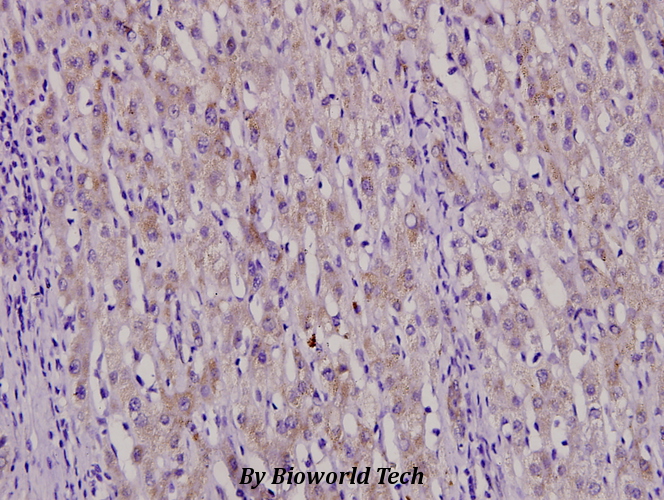Product Name :
PAI-3 (L291) polyclonal antibody Background :
PAI-1, PAI-2 and PAI-3 (plasminogen activator inhibitor-1, -2 and -3) are members of the serpin serine proteinase inhibitor family. PAI-1 and PAI-2 regulate uPA (urokinase-type plasminogen activator) and TPA (tissue plasminogen activator), resulting in the inhibition of proteolytic activity. Members of the serpin family generally complex with their target proteinases, then disassociate slowly into cleaved species that fold into stable inactive forms. PAI-1 can fold into the inactive state without cleavage resulting in the latent form of PAI-1. Activity can be restored to the latent form of PAI-1 through denaturation and renaturation. PAI-2 occurs in secreted and cytosolic forms through facultative polypeptide translocation. PAI-3 inhibits plasminogen activators as well as activated protein C. PAI-3 is secreted in plasma, but is also expressed in liver. Product :
Rabbit IgG, 1mg/ml in PBS with 0.02% sodium azide, 50% glycerol, pH7.2 Storage&Stability :
Store at 4°C short term. Aliquot and store at -20°C long term. Avoid freeze-thaw cycles. Specificity :
PAI-3 (L291) polyclonal antibody detects endogenous levels of PAI-3 protein. Immunogen :
Synthetic peptide, corresponding to amino acids 261-310 of Human PAI-3. Conjugate :
Unconjugated Modification :
Unmodification
PAI-3 (L291) polyclonal antibody Background :
PAI-1, PAI-2 and PAI-3 (plasminogen activator inhibitor-1, -2 and -3) are members of the serpin serine proteinase inhibitor family. PAI-1 and PAI-2 regulate uPA (urokinase-type plasminogen activator) and TPA (tissue plasminogen activator), resulting in the inhibition of proteolytic activity. Members of the serpin family generally complex with their target proteinases, then disassociate slowly into cleaved species that fold into stable inactive forms. PAI-1 can fold into the inactive state without cleavage resulting in the latent form of PAI-1. Activity can be restored to the latent form of PAI-1 through denaturation and renaturation. PAI-2 occurs in secreted and cytosolic forms through facultative polypeptide translocation. PAI-3 inhibits plasminogen activators as well as activated protein C. PAI-3 is secreted in plasma, but is also expressed in liver. Product :
Rabbit IgG, 1mg/ml in PBS with 0.02% sodium azide, 50% glycerol, pH7.2 Storage&Stability :
Store at 4°C short term. Aliquot and store at -20°C long term. Avoid freeze-thaw cycles. Specificity :
PAI-3 (L291) polyclonal antibody detects endogenous levels of PAI-3 protein. Immunogen :
Synthetic peptide, corresponding to amino acids 261-310 of Human PAI-3. Conjugate :
Unconjugated Modification :
Unmodification
-

-
 Immunohistochemistry (IHC) analyzes of PAI-3 (L291) pAb in paraffin-embedded liver cancer tissue at 1:100.
Immunohistochemistry (IHC) analyzes of PAI-3 (L291) pAb in paraffin-embedded liver cancer tissue at 1:100.
Bioworld Biotech only provide peptides for our antibodies and do not provide additional peptide customization services.
Price/Size :
USD 368/1mg/vial
Tips:
For phospho antibody, we provide phospho peptide(0.5mg) and non-phospho peptide(0.5mg).Describe :
Blocking peptides are peptides that bind specifically to the target antibody and block antibody binding. These peptide usually contains the epitope recognized by the antibody. Antibodies bound to the blocking peptide no longer bind to the epitope on the target protein. This mechanism is useful when non-specific binding is an issue, for example, in Western blotting (WB) and Immunohistochemistry (IHC). By comparing the staining from the blocked antibody versus the antibody alone, one can see which staining is specific; Specific binding will be absent from the western blot or IHC performed with the neutralized antibody.Formula:
Synthetic peptide was lyophilized with 100% acetonitrile and is supplied as a powder. Reconstitute with 0.1 ml DI water for a final concentration of 10 mg/ml.The purity is >90%,tested by HPLC and MS.
Storage:
The freeze-dried powder is more stable. For short time at 2-8°C. For long term storage store at -20°C.
Note :
This product is for research use only (RUO only). Not for use in diagnostic or therapeutic procedures.
 PAI-3 (L291) polyclonal antibody
PAI-3 (L291) polyclonal antibody  Datasheet
Datasheet COA
COA MSDS
MSDS SHIP
SHIP